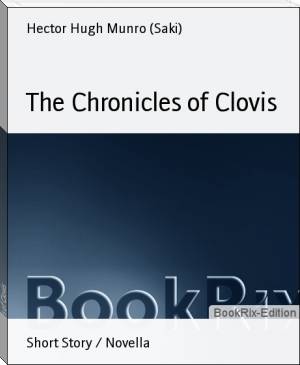The Chronicles of Clovis - Hector Hugh Munro (Saki) (large ebook reader TXT) 📗

- Author: Hector Hugh Munro (Saki)
Book online «The Chronicles of Clovis - Hector Hugh Munro (Saki) (large ebook reader TXT) 📗». Author Hector Hugh Munro (Saki)
and hayricks till he reached the lane at the back of the farm. A few minutes' walk, which only the burden of his portmanteaux restrained from developing into an undisguised run, brought him to a main road, where the early carrier soon overtook him and sped him onward to the neighbouring town. At a bend of the road he caught a last glimpse of the farm; the old gabled roofs and thatched barns, the straggling orchard, and the medlar tree, with its wooden seat, stood out with an almost spectral clearness in the early morning light, and over it all brooded that air of magic possession which Crefton had once mistaken for peace.
The bustle and roar of Paddington Station smote on his ears with a welcome protective greeting.
"Very bad for our nerves, all this rush and hurry," said a fellow- traveller; "give me the peace and quiet of the country."
Crefton mentally surrendered his share of the desired commodity. A crowded, brilliantly over-lighted music-hall, where an exuberant rendering of "1812" was being given by a strenuous orchestra, came nearest to his ideal of a nerve sedative.
THE TALKING-OUT OF TARRINGTON
"Heavens!" exclaimed the aunt of Clovis, "here's some one I know bearing down on us. I can't remember his name, but he lunched with us once in Town. Tarrington - yes, that's it. He's heard of the picnic I'm giving for the Princess, and he'll cling to me like a lifebelt till I give him an invitation; then he'll ask if he may bring all his wives and mothers and sisters with him. That's the worst of these small watering-places; one can't escape from anybody."
"I'll fight a rearguard action for you if you like to do a bolt now," volunteered Clovis; "you've a clear ten yards start if you don't lose time."
The aunt of Clovis responded gamely to the suggestion, and churned away like a Nile steamer, with a long brown ripple of Pekingese spaniel trailing in her wake.
"Pretend you don't know him," was her parting advice, tinged with the reckless courage of the non-combatant.
The next moment the overtures of an affably disposed gentleman were being received by Clovis with a "silent-upon-a-peak-in- Darien" stare which denoted an absence of all previous acquaintance with the object scrutinized.
"I expect you don't know me with my moustache," said the new- comer; "I've only grown it during the last two months."
"On the contrary," said Clovis, "the moustache is the only thing about you that seemed familiar to me. I felt certain that I had met it somewhere before."
"My name is Tarrington," resumed the candidate for recognition.
"A very useful kind of name," said Clovis; "with a name of that sort no one would blame you if you did nothing in particular heroic or remarkable, would they? And yet if you were to raise a troop of light horse in a moment of national emergency, 'Tarrington's Light Horse' would sound quite appropriate and pulse-quickening; whereas if you were called Spoopin, for instance, the thing would be out of the question. No one, even in a moment of national emergency, could possibly belong to Spoopin's Horse."
The new-comer smiled weakly, as one who is not to be put off by mere flippancy, and began again with patient persistence:
"I think you ought to remember my name - "
"I shall," said Clovis, with an air of immense sincerity. "My aunt was asking me only this morning to suggest names for four young owls she's just had sent her as pets. I shall call them all Tarrington; then if one or two of them die or fly away, or leave us in any of the ways that pet owls are prone to, there will be always one or two left to carry on your name. And my aunt won't LET me forget it; she will always be asking 'Have the Tarringtons had their mice?' and questions of that sort. She says if you keep wild creatures in captivity you ought to see after their wants, and of course she's quite right there."
"I met you at luncheon at your aunt's house once - " broke in Mr. Tarrington, pale but still resolute.
"My aunt never lunches," said Clovis; "she belongs to the National Anti-Luncheon League, which is doing quite a lot of good work in a quiet, unobtrusive way. A subscription of half a crown per quarter entitles you to go without ninety-two luncheons."
"This must be something new," exclaimed Tarrington.
"It's the same aunt that I've always had," said Clovis coldly.
"I perfectly well remember meeting you at a luncheon-party given by your aunt," persisted Tarrington, who was beginning to flush an unhealthy shade of mottled pink.
"What was there for lunch?" asked Clovis.
"Oh, well, I don't remember that - "
"How nice of you to remember my aunt when you can no longer recall the names of the things you ate. Now my memory works quite differently. I can remember a menu long after I've forgotten the hostess that accompanied it. When I was seven years old I recollect being given a peach at a garden-party by some Duchess or other; I can't remember a thing about her, except that I imagine our acquaintance must have been of the slightest, as she called me a 'nice little boy,' but I have unfading memories of that peach. It was one of those exuberant peaches that meet you halfway, so to speak, and are all over you in a moment. It was a beautiful unspoiled product of a hothouse, and yet it managed quite successfully to give itself the airs of a compote. You had to bite it and imbibe it at the same time. To me there has always been something charming and mystic in the thought of that delicate velvet globe of fruit, slowly ripening and warming to perfection through the long summer days and perfumed nights, and then coming suddenly athwart my life in the supreme moment of its existence. I can never forget it, even if I wished to. And when I had devoured all that was edible of it, there still remained the stone, which a heedless, thoughtless child would doubtless have thrown away; I put it down the neck of a young friend who was wearing a very DÉCOLLETÉ sailor suit. I told him it was a scorpion, and from the way he wriggled and screamed he evidently believed it, though where the silly kid imagined I could procure a live scorpion at a garden-party I don't know. Altogether, that peach is for me an unfading and happy memory - "
The defeated Tarrington had by this time retreated out of ear- shot, comforting himself as best he might with the reflection that a picnic which included the presence of Clovis might prove a doubtfully agreeable experience.
"I shall certainly go in for a Parliamentary career," said Clovis to himself as he turned complacently to rejoin his aunt. "As a talker-out of inconvenient bills I should be invaluable."
THE HOUNDS OF FATE
In the fading light of a close dull autumn afternoon Martin Stoner plodded his way along muddy lanes and rut-seamed cart tracks that led he knew not exactly whither. Somewhere in front of him, he fancied, lay the sea, and towards the sea his footsteps seemed persistently turning; why he was struggling wearily forward to that goal he could scarcely have explained, unless he was possessed by the same instinct that turns a hard-pressed stag cliffward in its last extremity. In his case the hounds of Fate were certainly pressing him with unrelenting insistence; hunger, fatigue, and despairing hopelessness had numbed his brain, and he could scarcely summon sufficient energy to wonder what underlying impulse was driving him onward. Stoner was one of those unfortunate individuals who seem to have tried everything; a natural slothfulness and improvidence had always intervened to blight any chance of even moderate success, and now he was at the end of his tether, and there was nothing more to try. Desperation had not awakened in him any dormant reserve of energy; on the contrary, a mental torpor grew up round the crisis of his fortunes. With the clothes he stood up in, a halfpenny in his pocket, and no single friend or acquaintance to turn to, with no prospect either of a bed for the night or a meal for the morrow, Martin Stoner trudged stolidly forward, between moist hedgerows and beneath dripping trees, his mind almost a blank, except that he was subconsciously aware that somewhere in front of him lay the sea. Another consciousness obtruded itself now and then - the knowledge that he was miserably hungry. Presently he came to a halt by an open gateway that led into a spacious and rather neglected farm-garden; there was little sign of life about, and the farm-house at the further end of the garden looked chill and inhospitable. A drizzling rain, however, was setting in, and Stoner thought that here perhaps he might obtain a few minutes' shelter and buy a glass of milk with his last remaining coin. He turned slowly and wearily into the garden and followed a narrow, flagged path up to a side door. Before he had time to knock the door opened and a bent, withered-looking old man stood aside in the doorway as though to let him pass in.
"Could I come in out of the rain?" Stoner began, but the old man interrupted him.
"Come in, Master Tom. I knew you would come back one of these days."
Stoner lurched across the threshold and stood staring uncomprehendingly at the other.
"Sit down while I put you out a bit of supper," said the old man with quavering eagerness. Stoner's legs gave way from very weariness, and he sank inertly into the arm-chair that had been pushed up to him. In another minute he was devouring the cold meat, cheese, and bread, that had been placed on the table at his side.
"You'm little changed these four years," went on the old man, in a voice that sounded to Stoner as something in a dream, far away and inconsequent; "but you'll find us a deal changed, you will. There's no one about the place same as when you left; nought but me and your old Aunt. I'll go and tell her that you'm come; she won't be seeing you, but she'll let you stay right enough. She always did say if you was to come back you should stay, but she'd never set eyes on you or speak to you again."
The old man placed a mug of beer on the table in front of Stoner and then hobbled away down a long passage. The drizzle of rain had changed to a furious lashing downpour, which beat violently against door and windows. The wanderer thought with a shudder of what the sea-shore must look like under this drenching rainfall, with night beating down on all sides. He finished the food and beer and sat numbly waiting for the return of his strange host. As the minutes ticked by on the grandfather clock in the corner a new hope began to flicker and grow in the young man's mind; it was merely the expansion of his former craving for food and a few minutes' rest into a longing to find a night's shelter under this seemingly hospitable roof. A clattering of footsteps down the passage heralded the
The bustle and roar of Paddington Station smote on his ears with a welcome protective greeting.
"Very bad for our nerves, all this rush and hurry," said a fellow- traveller; "give me the peace and quiet of the country."
Crefton mentally surrendered his share of the desired commodity. A crowded, brilliantly over-lighted music-hall, where an exuberant rendering of "1812" was being given by a strenuous orchestra, came nearest to his ideal of a nerve sedative.
THE TALKING-OUT OF TARRINGTON
"Heavens!" exclaimed the aunt of Clovis, "here's some one I know bearing down on us. I can't remember his name, but he lunched with us once in Town. Tarrington - yes, that's it. He's heard of the picnic I'm giving for the Princess, and he'll cling to me like a lifebelt till I give him an invitation; then he'll ask if he may bring all his wives and mothers and sisters with him. That's the worst of these small watering-places; one can't escape from anybody."
"I'll fight a rearguard action for you if you like to do a bolt now," volunteered Clovis; "you've a clear ten yards start if you don't lose time."
The aunt of Clovis responded gamely to the suggestion, and churned away like a Nile steamer, with a long brown ripple of Pekingese spaniel trailing in her wake.
"Pretend you don't know him," was her parting advice, tinged with the reckless courage of the non-combatant.
The next moment the overtures of an affably disposed gentleman were being received by Clovis with a "silent-upon-a-peak-in- Darien" stare which denoted an absence of all previous acquaintance with the object scrutinized.
"I expect you don't know me with my moustache," said the new- comer; "I've only grown it during the last two months."
"On the contrary," said Clovis, "the moustache is the only thing about you that seemed familiar to me. I felt certain that I had met it somewhere before."
"My name is Tarrington," resumed the candidate for recognition.
"A very useful kind of name," said Clovis; "with a name of that sort no one would blame you if you did nothing in particular heroic or remarkable, would they? And yet if you were to raise a troop of light horse in a moment of national emergency, 'Tarrington's Light Horse' would sound quite appropriate and pulse-quickening; whereas if you were called Spoopin, for instance, the thing would be out of the question. No one, even in a moment of national emergency, could possibly belong to Spoopin's Horse."
The new-comer smiled weakly, as one who is not to be put off by mere flippancy, and began again with patient persistence:
"I think you ought to remember my name - "
"I shall," said Clovis, with an air of immense sincerity. "My aunt was asking me only this morning to suggest names for four young owls she's just had sent her as pets. I shall call them all Tarrington; then if one or two of them die or fly away, or leave us in any of the ways that pet owls are prone to, there will be always one or two left to carry on your name. And my aunt won't LET me forget it; she will always be asking 'Have the Tarringtons had their mice?' and questions of that sort. She says if you keep wild creatures in captivity you ought to see after their wants, and of course she's quite right there."
"I met you at luncheon at your aunt's house once - " broke in Mr. Tarrington, pale but still resolute.
"My aunt never lunches," said Clovis; "she belongs to the National Anti-Luncheon League, which is doing quite a lot of good work in a quiet, unobtrusive way. A subscription of half a crown per quarter entitles you to go without ninety-two luncheons."
"This must be something new," exclaimed Tarrington.
"It's the same aunt that I've always had," said Clovis coldly.
"I perfectly well remember meeting you at a luncheon-party given by your aunt," persisted Tarrington, who was beginning to flush an unhealthy shade of mottled pink.
"What was there for lunch?" asked Clovis.
"Oh, well, I don't remember that - "
"How nice of you to remember my aunt when you can no longer recall the names of the things you ate. Now my memory works quite differently. I can remember a menu long after I've forgotten the hostess that accompanied it. When I was seven years old I recollect being given a peach at a garden-party by some Duchess or other; I can't remember a thing about her, except that I imagine our acquaintance must have been of the slightest, as she called me a 'nice little boy,' but I have unfading memories of that peach. It was one of those exuberant peaches that meet you halfway, so to speak, and are all over you in a moment. It was a beautiful unspoiled product of a hothouse, and yet it managed quite successfully to give itself the airs of a compote. You had to bite it and imbibe it at the same time. To me there has always been something charming and mystic in the thought of that delicate velvet globe of fruit, slowly ripening and warming to perfection through the long summer days and perfumed nights, and then coming suddenly athwart my life in the supreme moment of its existence. I can never forget it, even if I wished to. And when I had devoured all that was edible of it, there still remained the stone, which a heedless, thoughtless child would doubtless have thrown away; I put it down the neck of a young friend who was wearing a very DÉCOLLETÉ sailor suit. I told him it was a scorpion, and from the way he wriggled and screamed he evidently believed it, though where the silly kid imagined I could procure a live scorpion at a garden-party I don't know. Altogether, that peach is for me an unfading and happy memory - "
The defeated Tarrington had by this time retreated out of ear- shot, comforting himself as best he might with the reflection that a picnic which included the presence of Clovis might prove a doubtfully agreeable experience.
"I shall certainly go in for a Parliamentary career," said Clovis to himself as he turned complacently to rejoin his aunt. "As a talker-out of inconvenient bills I should be invaluable."
THE HOUNDS OF FATE
In the fading light of a close dull autumn afternoon Martin Stoner plodded his way along muddy lanes and rut-seamed cart tracks that led he knew not exactly whither. Somewhere in front of him, he fancied, lay the sea, and towards the sea his footsteps seemed persistently turning; why he was struggling wearily forward to that goal he could scarcely have explained, unless he was possessed by the same instinct that turns a hard-pressed stag cliffward in its last extremity. In his case the hounds of Fate were certainly pressing him with unrelenting insistence; hunger, fatigue, and despairing hopelessness had numbed his brain, and he could scarcely summon sufficient energy to wonder what underlying impulse was driving him onward. Stoner was one of those unfortunate individuals who seem to have tried everything; a natural slothfulness and improvidence had always intervened to blight any chance of even moderate success, and now he was at the end of his tether, and there was nothing more to try. Desperation had not awakened in him any dormant reserve of energy; on the contrary, a mental torpor grew up round the crisis of his fortunes. With the clothes he stood up in, a halfpenny in his pocket, and no single friend or acquaintance to turn to, with no prospect either of a bed for the night or a meal for the morrow, Martin Stoner trudged stolidly forward, between moist hedgerows and beneath dripping trees, his mind almost a blank, except that he was subconsciously aware that somewhere in front of him lay the sea. Another consciousness obtruded itself now and then - the knowledge that he was miserably hungry. Presently he came to a halt by an open gateway that led into a spacious and rather neglected farm-garden; there was little sign of life about, and the farm-house at the further end of the garden looked chill and inhospitable. A drizzling rain, however, was setting in, and Stoner thought that here perhaps he might obtain a few minutes' shelter and buy a glass of milk with his last remaining coin. He turned slowly and wearily into the garden and followed a narrow, flagged path up to a side door. Before he had time to knock the door opened and a bent, withered-looking old man stood aside in the doorway as though to let him pass in.
"Could I come in out of the rain?" Stoner began, but the old man interrupted him.
"Come in, Master Tom. I knew you would come back one of these days."
Stoner lurched across the threshold and stood staring uncomprehendingly at the other.
"Sit down while I put you out a bit of supper," said the old man with quavering eagerness. Stoner's legs gave way from very weariness, and he sank inertly into the arm-chair that had been pushed up to him. In another minute he was devouring the cold meat, cheese, and bread, that had been placed on the table at his side.
"You'm little changed these four years," went on the old man, in a voice that sounded to Stoner as something in a dream, far away and inconsequent; "but you'll find us a deal changed, you will. There's no one about the place same as when you left; nought but me and your old Aunt. I'll go and tell her that you'm come; she won't be seeing you, but she'll let you stay right enough. She always did say if you was to come back you should stay, but she'd never set eyes on you or speak to you again."
The old man placed a mug of beer on the table in front of Stoner and then hobbled away down a long passage. The drizzle of rain had changed to a furious lashing downpour, which beat violently against door and windows. The wanderer thought with a shudder of what the sea-shore must look like under this drenching rainfall, with night beating down on all sides. He finished the food and beer and sat numbly waiting for the return of his strange host. As the minutes ticked by on the grandfather clock in the corner a new hope began to flicker and grow in the young man's mind; it was merely the expansion of his former craving for food and a few minutes' rest into a longing to find a night's shelter under this seemingly hospitable roof. A clattering of footsteps down the passage heralded the
Free e-book «The Chronicles of Clovis - Hector Hugh Munro (Saki) (large ebook reader TXT) 📗» - read online now
Similar e-books:





Comments (0)